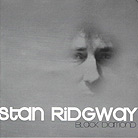April 2003
Ridgway is the kind of unique artist who can tempt critics into deep thoughts, and he probably merits most of them. He’s a natural storyteller who writes songs that create a strong mood. He takes risks, and he’s hard to peg -- not quite a pop singer, but not so avant-garde as to be inaccessible. While he’s uncompromising in his approach, he’s fun to listen to. Ridgway’s a cult artist who should have a larger following because he likes melody and he creates recordings that are intricate and luxurious. Black Diamond is a more open and spacious recording than the three discs that preceded it, but there’s plenty of sound for your gear to pull out of it. Sound is important to Ridgway. He uses it to create atmosphere in an almost cinematic way, injecting a keyboard sound or effect to suggest a setting or to underscore a point (it’s almost enough to make this two-channel listener consider surround sound). It helps to be attuned to the cultural zeitgeist to truly appreciate what Ridgway is getting at. He frequently makes sly references to movie soundtracks and bits of pop culture kitsch. Ridgway doesn’t use these references cynically or as a shortcut to cheap emotion. He uses them to help fill out the story he’s telling. In "Big Dumb Town," a heavily-tremeloed guitar helps create the same feeling of physical discomfort one might feel around the confidence man the song describes. "Knife and Fork" uses an odd, distorted keyboard sound to give an ominous edge to the story of a disturbed, overeager seducer. Sometimes Ridgway uses a more straightforward approach. "Luther Played Guitar" pays tribute to Johnny Cash’s guitarist, Luther Perkins, by employing the stark, moving simplicity of the Tennessee Two. Since Ridgway creates his stories with humor and a measure of compassion, even unsavory characters are never just stick figures. The narrator of "Knife and Fork" tells the object of his affection that "for your sweet, sweet love I’ll even go back on re-hab." The mixture of creepiness and need is both disturbing and oddly moving. As a singer, Ridgway inhabits his characters the way an actor does, and his performances have some of the feel of musical theater -- slightly off-kilter musicals, written by, say, thriller writer Jim Thompson. It would be too easy to create a daunting "serious artist" aura around Ridgway, which is what I set out to avoid here. There’s no getting around the fact that he works hard on his recordings and avoids clichés, both in the melodies he writes and in his lyrics. Ridgway’s a serious guy. Don’t let that fact keep you from enjoying his music. After I played Black Diamond three or four days in a row, my five-year-old son was humming the beautiful, loping piano line that runs through "Knife and Fork." "I like that, Dad," he told me. You’ll like it, too. GO BACK TO: |
 Stan Ridgway - Black
Diamond
Stan Ridgway - Black
Diamond When Houghton Mifflin reissued
a volume of three books by Richard Brautigan a little more than ten years ago, Tom McGuane
wrote of his friend’s work, "These books are fun to read. . .you can get all the
old fictional good things." New West Records has just reissued Stan Ridgway’s Black
Diamond, which appeared briefly on a small label in 1995 and disappeared from print
soon after that. I want to state up front that you can get all the old musical good things
from it.
When Houghton Mifflin reissued
a volume of three books by Richard Brautigan a little more than ten years ago, Tom McGuane
wrote of his friend’s work, "These books are fun to read. . .you can get all the
old fictional good things." New West Records has just reissued Stan Ridgway’s Black
Diamond, which appeared briefly on a small label in 1995 and disappeared from print
soon after that. I want to state up front that you can get all the old musical good things
from it.